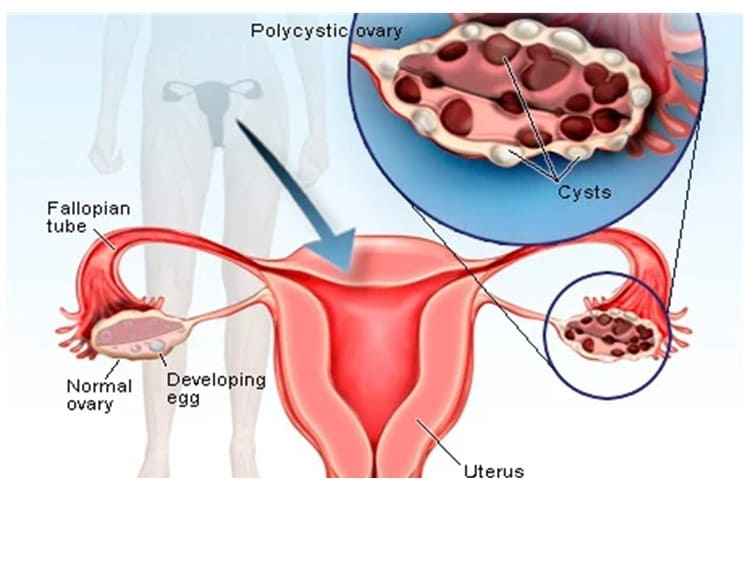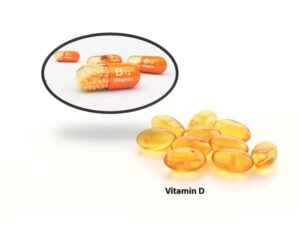How to prevent PCOS
PCOS is a hormonal disorder that affects females during their fertile or reproductive age (ages 15 to 44). PCOS affects between 2.2 and 26.7 percent of women in this age group. Many women are unaware that they have PCOS. According to one study, up to 70 percent of total women with PCOS were undiagnosed. PCOS affects a woman’s ovaries, which are reproductive organs that produce estrogen and progesterone. These hormones regulate the menstrual cycle. Male hormones such as androgens are also produced in modest amounts by the ovaries. But PCOS triggers the synthesis of excess male hormones that a female should have. The hormonal imbalances may lead to hair growth on the face and body and menstrual abnormalities, making it difficult for a woman to conceive.
The pituitary gland produces follicle-stimulating hormone (FSH) and luteinizing hormone (LH) that regulate ovulation (the monthly release of an ovum). PCOS affects ovulation and the ovaries. The condition has three primary characteristics:
- Multiple follicles in the ovary.
- Male hormones in excessive concentrations
- Periods that are irregular or missing
Polycystic ovarian syndrome (PCOS), in addition to altering a woman’s hormone levels, can also lead to long-term health issues such as infertility, obesity, diabetes, and heart disease.
Causes of PCOS
Doctors do not have all of the answers as to why certain females get PCOS. If your sibling or mother has PCOS, you’re more prone to have it as well. It could also be linked to issues that cause your body to create too much insulin, which can interfere with your ovaries’ capacity to ovulate.
How to prevent PCOS?
Beat Insulin Resistance: Understanding and eliminating insulin resistance is essential if you want to get rid of PCOS for good. The great news is that most cases of insulin resistance can be entirely reversed with a change in lifestyle. As a first step toward reversing insulin resistance and PCOS, you should consume a nutrient-dense, low-glycemic index, anti-inflammatory food.
Correct Major Micronutrient Deficiencies: It’s important to keep in mind that you might be on a low-carb, low-fat, low-calorie, vegan, or vegetarian diet and yet have substantial micronutrient deficiencies, putting you at risk for PCOS. Take foods rich in Vitamin B and D, iron, magnesium, and zinc.
Remove Toxin Exposures: We are exposed to a variety of toxins that can disrupt hormonal balance and raise the risk of illnesses such as PCOS. Endocrine-disrupting chemicals, or EDCs, are chemicals that interfere with hormone production, and the most commonly studied ones are found in plastics like Bisphenol-A.
How to Prevent PCOS by avoiding Toxin Exposure
- Glass and stainless steel should be used instead of plastic food containers and water bottles.
- Check all skincare (cosmetic products), household items, and other items for “green” alternatives.
- Consume the purest, most natural foods and beverages available, including the water you consume.
Boost Physical Activity: You must maintain a high level of exercise to keep your blood glucose and insulin levels down, which aids in the reduction of insulin resistance. Although workout is necessary, it is also important to remember that diet is crucial.
Diet
Many women who have been physically active throughout their entire lives have also developed insulin resistance, type 2 diabetes, and PCOS – owing to a single factor – that is poor diet and nutrition.
Eliminate Dairy Products: There has been some research linking PCOS to dairy consumption, although the link is far from conclusive. Dairy can enhance androgen production, aggravating acne problems. Therefore, women should avoid dairy for up to 3 to 4 weeks and then resume it to see whether their symptoms flare-up. Acne frequently clears up entirely at this time. Some women benefit from dairy abstinence, while others are satisfied with limiting their dairy intake to no more than two servings per day and focusing on fermented dairy (kefir, yogurt) and low grass-fed full-fat milk.
Eat More Omega-3s: While eating too much dairy can raise androgen levels, one study found that eating more Omega-3s can lower them. Chilled water fish (Mackerel, Salmon, Albacore Tuna, Sardines, etc.), nuts (particularly walnuts), seeds (chia and flax), and egg yolks are high in these beneficial fats.
Treatment
Unwanted symptoms such as hair growth on the face and body, acne are due to high amounts of male hormones. Doctors normally suggest lifestyle changes as the first line of treatment for PCOS, and they often succeed. Weight loss can help with PCOS symptoms and increase your chances of becoming pregnant. Weight loss can be achieved through a combination of diet and aerobic exercise. If lifestyle modifications don’t work, prescriptions are an alternative. Both birth control pills and metformin can help PCOS females by restoring normal hormonal levels and menstrual periods. Birth control pills can help decrease androgen production that can cause excessive hair growth.
Treatments are available for the symptoms. You may also be able to conceive when your gynecologist suggests an apt treatment based on your symptoms.
Combination birth control Pills
Estrogen and progestin present in these pills help in reducing androgen production and regulating estrogen synthesis. Hormonal regulation helps in reducing unwanted and excessive hair growth, acne and correcting abnormal bleeding, and regulating the menstrual cycle. If you still have concerns about how to prevent PCOS and If you suspect that you may have PCOS you must consult your gynecologist.




